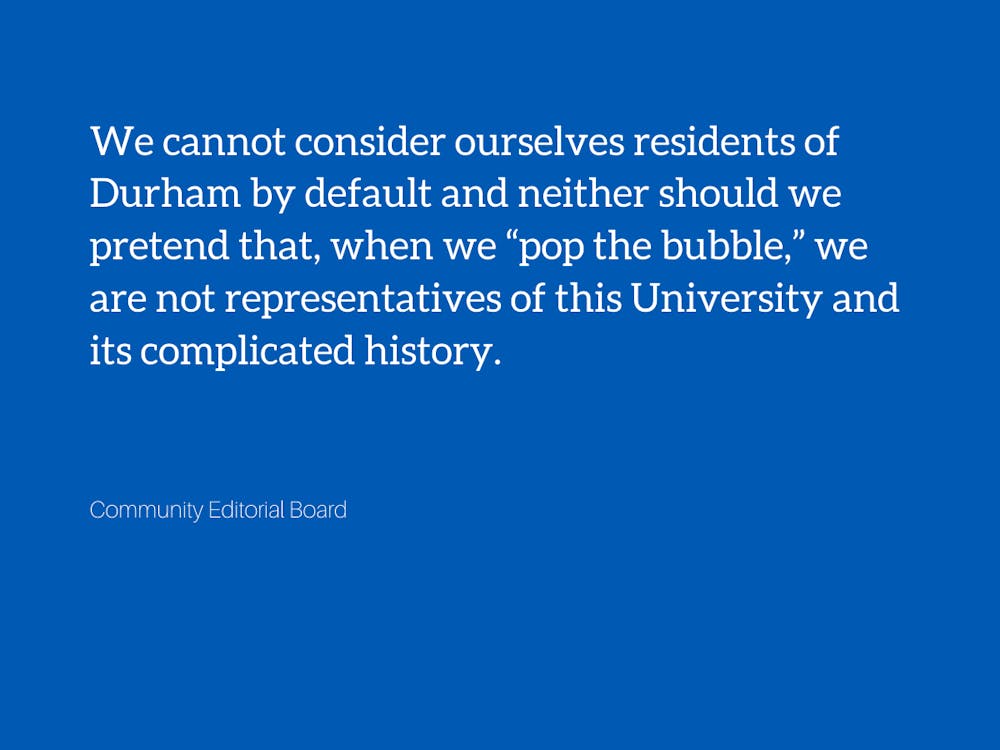The Community Editorial Board is independent of the Editorial Staff of the Chronicle.
On November 5, the city of Durham will have its municipal elections. On the ballot this election is the mayor’s seat, three at-large council members and the Affordable Housing Bond. Over the years, Duke students have been told to “care” about and vote in the local elections, from Chronicle opinion columns to POLIS’s comprehensive all-in voter engagement plan. Yet voting in Durham is situated within a larger conversation of “caring,” as students in the University. As Duke undergraduates, what does it mean for us to “care” about Durham and its politics?
The 2019 Durham Voter Guide uses the tagline: “This is your city, your home. Now Durham’s future is up to you.” But for many undergraduate students, our time in Durham is temporary, equivalent to an average of four years at Duke—living in Durham is seen as incidental to the Duke experience. There is a shared consciousness of the “Duke bubble,” but “popping the bubble” and being more involved in Durham must come with some amount of reflection and intention as well. For Durham to become “our city, our home,” it demands more than volunteer hours.
To begin, the campus discussion on municipal politics need not center on Duke undergraduates. Though we primarily interact with the University as an institution of higher education, Duke’s relationship with Durham is primarily as a business and as an employer. To say, as some have, that students should involve themselves in politics because they are “so much more well-educated, so much more affluent, and have so much more time on their hands” not only assumes a monolithic student population, but fails to fully acknowledge the position that undergraduates occupy. We cannot consider ourselves residents of Durham by default and neither should we pretend that, when we “pop the bubble,” we are not representatives of this University and its complicated history.
These considerations are particularly relevant this election cycle as Durham is asked to vote on an Affordable Housing Bond. The bond is supported by local politicians and community organizations, and there have been calls to get students involved. An ambitious plan to tackle housing affordability in Durham, the bond will be financed by property taxes—a cost that few, if any, undergraduates will bear. Similarly, as detailed in our editorial last week, the University is directly responsible for much of the downtown growth that has spurred this affordability crisis, yet no calls to action or cajoling of the student electorate has engaged with or even acknowledged this history. To ask students to vote in the hopes that they might benefit from a solution to a problem Duke created without requiring any of the cost to fall on the University is misinformed at best and disingenuous at worst.
Without taking a definitive stand on the bond or any of the other items on the ballot this Tuesday, we would urge a greater reflexivity and degree of reflection, especially in the undergraduate community. A guilt-ridden vote in the municipal election is certainly not the only way to “care” and neither is it necessarily the best way. At the very least, arguing that voting is equivalent to caring excludes those who are not able to vote or who choose to vote elsewhere in communities in which they feel more at home. There are students and community members who are not given the right to vote or have been institutionally and systematically disenfranchised, including international students, undocumented immigrants, Black voters and Indigenous peoples.
There are other ways to “care” about Durham and its politics, especially in supporting the communities in Durham that were organizing before we came and will continue to organize long after we leave. These include groups such as Durham for All, Southerners on New Ground, and Durham CAN. To be in solidarity with them, we can show up with our physical presence when they call us to; we can listen; and we can commit to a process of learning that is forever ongoing.
At Duke, we tend to exist within a narrow understanding of what is good and bad, with such limited examples of what is good. But voting is not and cannot be the end-all-be-all of political engagement. There is not one “good” or “right” political move, voting or otherwise, as we might discover if we spend some time being considerate—what does it mean to volunteer with this organization? Or, vote for this candidate? Or, shop at this specific business? When we leave campus and interact with Durham, we are representatives of the University, whether we actively choose to be or not. So if we are to pop the bubble, let us do so with care.
Get The Chronicle straight to your inbox
Signup for our weekly newsletter. Cancel at any time.

